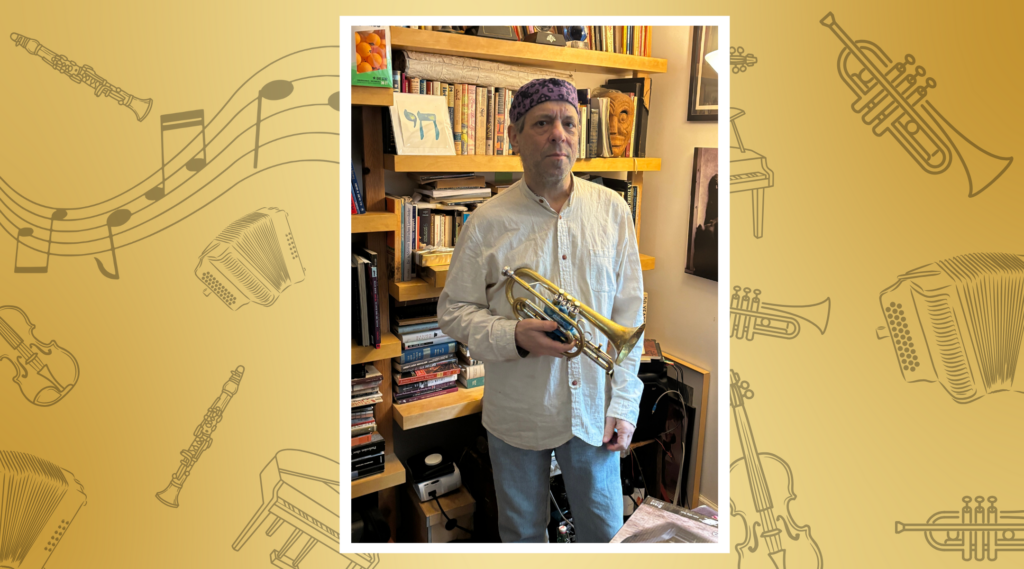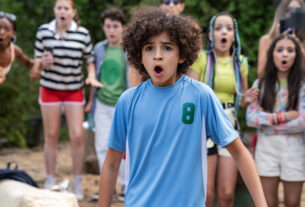Frank London, a trumpeter, composer and one of the most influential Jewish musicians of his era, is bouncing back from a medical crisis that took him out of commission for six months — and forced him to relearn how to play his instrument.
London, 66, was successfully treated for myelofibrosis, the aggressive blood cancer that necessitated his hospitalization last spring. From late May to late September, London received a stem cell transplant, had his spleen removed and underwent chemotherapy.
But since mid-December, London is back to his busy schedule of performing and starting new and wide-ranging musical projects. In a flurry of activity, in recent months London has taken a gig as a sideman for a Hanukkah performance, played Brazilian Jewish music at the New York Public Library, rejoined Itzhak Perlman’s klezmer tour and returned to the pioneering band that he founded in 1985, The Klezmatics.
And now, looking ahead, he’s planning to tour with the four ensembles he finished recordings with prior to his hospitalization. He’s also booking new gigs, including hosting a musical “pre-Purim carnival” at Drom on March 12.
Though doctors have given him a clean bill of health, London is living with the possibility that the cancer can come back at any time. “I’m going to get this stuff out there right now because I don’t know how much time I have,” London told the New York Jewish Week.
In a wide-ranging interview earlier this month at his home in the Alphabet City section of Manhattan, London spoke of how things have changed for him since he to grapple with his mortality — “things that I never bothered to think about or articulate,” he said. “It caused me to actually sit down and ask myself, ‘Who am I and what do I believe about this?’”
Though London said being a Jew is an essential part of who he is — he was raised in a Reform Jewish home — as he underwent treatment, he turned to the writings of Tibetan Buddhists and ancient Greek Stoic philosophers for guidance.
“One of the basic teachings of the Stoics is we cannot change or have an effect on what happens to us,” said London, who sipped coffee at his dining table during a two-hour conversation. “The only thing we can do something about is how we react to what happens to us.”
Confronting his own mortality, he said, made him focus on the numerous cultural projects he started, and use whatever time he has left to begin some new ones.
“He’s certainly making up for lost time,” Lorin Sklamberg, The Klezmatics’ accordion player and vocalist, told the New York Jewish Week.
Just prior to entering treatment at Manhattan’s Sloan Kettering Cancer Center, London finished four albums. He penned the eight new songs in “In the City of God” for a Simchat Torah synagogue ritual; “Spirit Stronger Than Blood” was named to the New York Times’ list of the top 10 jazz albums of 2024, and the record “Brass Conspiracy,” for John Zorn’s Tzadik label, is informed by Latin jazz, New Orleans brass bands and ragtime for John Zorn’s Tzadik label. London describes “Chronika,” from 2023, as a “stoner Hanukkah album” that features tracks by the late guitarist Yossi Piamenta, known as he Hasidic Hendrix.
London also finished scores for a production of “King Lear” by Yale lecturer Karin Coonrod, which opened at LaMama Experimental Theater in July 2024, and for an unreleased documentary titled “The Kid Officer,” which tells the story of a Jewish boy who fled Austria during the Holocaust and joined the Haganah in Palestine.
Seth Rogovoy, the Western Massachusetts-based author of “The Essential Klezmer,” said it’s impossible to overestimate London’s influence on the Jewish music scene in the past 45 years.
“There are so many spokes that connect him to so many people,” said Rogovoy. “I can’t keep track of all the bands and projects London is involved in.”
London was unable to play his trumpet for the three months he spent in the hospital and the subsequent three months he spent at home recuperating. It was the first time since he started playing at age 9 that he hadn’t played his horn for an extended period. The time away had a profound impact on his embouchure, the way a musician uses their lips, facial muscles, tongue and teeth to play wind instruments. London had lost muscle and had to relearn how to play the trumpet, so he posted a request for advice on FaceBook, tagging several trumpeters. The response from the “trumpet community,” he said, was helpful.
“I know I’m not at the place where I was a year ago,” he said. “I’m operating at 85% of where I was. I’ve got to build up my endurance.”
Frank London performs at a Flushing Town Hall concert event in 2021. (Courtesy of Flushing Town Hall)
Despite his critical self-assessment, friends and colleagues have been surprised by how soon London returned to the bandstand. “He has an incredible energy when it comes to making music,” noted Rogovoy. “He’s indefatigable in that way.”
Margot Leverett, the original clarinetist in The Klezmatics who has performed with London’s Klezmer Brass All-Stars in recent years, has long been impressed with the energy London can summon for live shows.
“Frank can drive six hours to a gig and then step out of the car and turn a huge room full of people into a wild, cathartic, ecstatic dancing scene,” she said.
Sklamberg said during London’s time away from The Klezmatics, the band has been getting its ducks in order for an upcoming album and tour to celebrate its 40th anniversary. Each track on the new album will feature a collaboration with different New York-based artists, London said. They’ll include a Brooklyn-based group of Crimean Tartar musicians, the Colombian women’s group La Manga and singer Janis Siegel from Manhattan Transfer.
“We have always collaborated with different artists from different traditions,” London said. “That’s one part of who we’ve always been.”
It’s also very much part of who Frank London has been. His omnivorous musical tastes have resulted in more than 500 recordings with everyone from Iggy Pop to Mel Tormé.
The saxophonist Paul Shapiro, who has played with London during his foray into Punjabi bhangra music, praised the trumpeter for having “one of the most wide-open musical minds on the planet. He reaches across boundaries and creates music that knows no boundaries.”
Despite the recent setbacks, London is still reaching. Among his upcoming endeavors is an oratorio based on “Erd-Vey” (“Earth-Woe”), a short Yiddish play by Israel Joshua Singer staged in 1923. London and Pete Rushefsky of the Center for Traditional Music and Dance are planning a project involving a smartphone app that will play music sung in endangered languages. London is also planning an all-night concert on June 1 as the inaugural event of a Jewish arts initiative being launched by The New Shul, an independent congregation active in both Manhattan and Brooklyn. The initiative is funded by a Jewish cheese mogul.
“I’ve always had a penchant for the weird in any genre of music,” said London, who also recently but together the Loisaida Fife and Drum Corps, an “insane ensemble” consisting of piccolo, coronet, trombone, violin, tuba and drums that plays brass music dating back to the Revolutionary War. It debuted at a Brooklyn performance space last week.
Shapiro, who is also a resident of Loisaida (as New Yoricans dubbed the Lower East Side), referred to his friend Frank London as “a great spirit.”
“Everybody is holding their breath and hoping we just hear good news about Frank forever,” Shapiro said.
Jewish stories matter, and so does your support.




